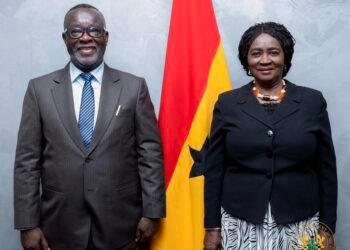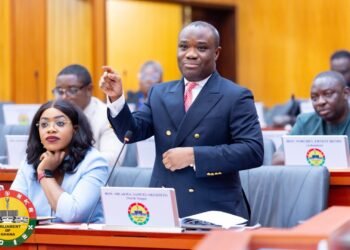Ghana, once a beacon of hope for Africa, now teeters on the brink of self-destruction. A pervasive culture of mediocrity has taken root, where incompetence is rewarded, accountability is ignored, and corruption thrives.
This dangerous trend, if unchecked, could plunge the nation into irreversible decline. In a sobering critique of Ghana’s current state of governance, Selorm Branttie, Vice President of IMANI Centre for Policy and Education, warned against what he described as the alarming complacency of the public and leadership alike.
His remarks reflect a deep-seated frustration with the all-too-common Ghanaian attitude captured in the phrase “obiaa boa”.
This sentiment, though seemingly trivial, according to Selorm Branttie masks a deeper issue: a resignation to mediocrity, corruption, and a culture that could drive the nation towards an irreversible moral and political decline.
His critique is not simply a matter of wordplay or cultural critique; he sees “obiaa boa” as a dangerous tacit approval of failure at all levels. When citizens endorse this mindset, he argued, they unwittingly empower leaders to act with impunity, without accountability.
For him, such views send the message that it is acceptable to ignore the fundamental responsibility of leadership—that those who make decisions affecting the lives of millions can fail without consequence, degrade public trust, and hollow out the very core of the nation.
“It means we should not nurture more leaders who care about the nation. It means we should rather encourage those with selfish intentions because, after all, everyone’s interest is to run things, make money for their family and forget about everyone”.
Selorm Branttie, Vice President of IMANI Centre for Policy and Education
“Obiaa boa”, Emboldens Bad Leadership
In Selorm Branttie’s words, the endorsement of “obiaa boa” essentially gives power to those whose poor decision-making erodes Ghana’s currency, disrupts businesses, and chips away at the country’s economic stability.
These failures, he pointed out, don’t just affect the stock markets or the business elite; they ripple through all levels of society, leaving citizens disillusioned, disempowered, and deeply frustrated.
By not challenging this, Selorm Branttie firmly posited that the people become complicit, accepting suffering as inevitable and stifling any hope for transformational change.
“People, we don’t live in a jungle,” Selorm Branttie declared, underscoring that Ghana is not merely a collection of individuals surviving in isolation; it is a state, governed by laws and structured to promote the welfare of its citizens.
Yet, by adopting this defeatist attitude, Selorm Branttie argued that the citizenry collectively blurs the lines between civilization and chaos, between governance and anarchy.
He also pointed out that in a jungle, might make right, and the powerful do as they please, however, he asserted that Ghana has a government, a democratic structure meant to hold leaders to account, a civil society designed to advocate for justice, and an economic system intended to promote prosperity for all.

Self-Interest over National Interest
The real danger, he opined, is that “obiaa boa” nurtures and encourages leaders who see their roles as mere avenues for personal gain, adding that it validates a culture where self-interest trumps national duty and where leaders pursue their own wealth with little regard for the public they serve.
“If ‘obiaa boa’ is truly the case, then let’s let jungle law prevail. Let’s allow galamsey to destroy our forests. Let’s allow the Hawks running around the corridors of power to cut all the deals and make their percentages off procurement”.
Selorm Branttie, Vice President of IMANI Centre for Policy and Education
He painted a bleak picture of a future where the country’s most valuable resources are squandered by unchecked greed, where corruption festers in the procurement process, and where the educational system fails to equip future generations.
The degradation of Ghana’s education system, as he described it, is particularly emblematic of this decline, asserting that when students are promoted without examinations, the illusion of progress takes precedence over genuine intellectual growth.
While such a system may seem to benefit all by moving students forward, the IMANI’s Vice President cautioned that in reality, it cheats them out of the skills and knowledge necessary to drive the country forward.
This, Selorm Branttie warned, is the sort of self-delusion that traps the country in a cycle of mediocrity.
For Selorm Branttie, the path forward requires a reckoning with the truth, stressing that Ghana is at a crossroads, where the public’s tolerance of corruption and failure has created a dangerously permissive environment.
This is not just a critique of government officials but a call for citizens to reject complacency, actively demand accountability, and foster a culture that values integrity and progress over personal gain.
Ghana’s survival and success depend on a profound shift in mindset—one that prioritizes the country and its citizens’ well-being over individual interests, and hence to shrug and say “obiaa boa” is to resign the nation to a fate unworthy of its people and its potential.
Now, more than ever, Ghana needs to wake up, demand accountability, and reclaim its vision for a future that serves every citizen, not just those in power.
READ ALSO: IMF Board Set to Review Ghana’s Economic Programme for $360 Million Disbursement























